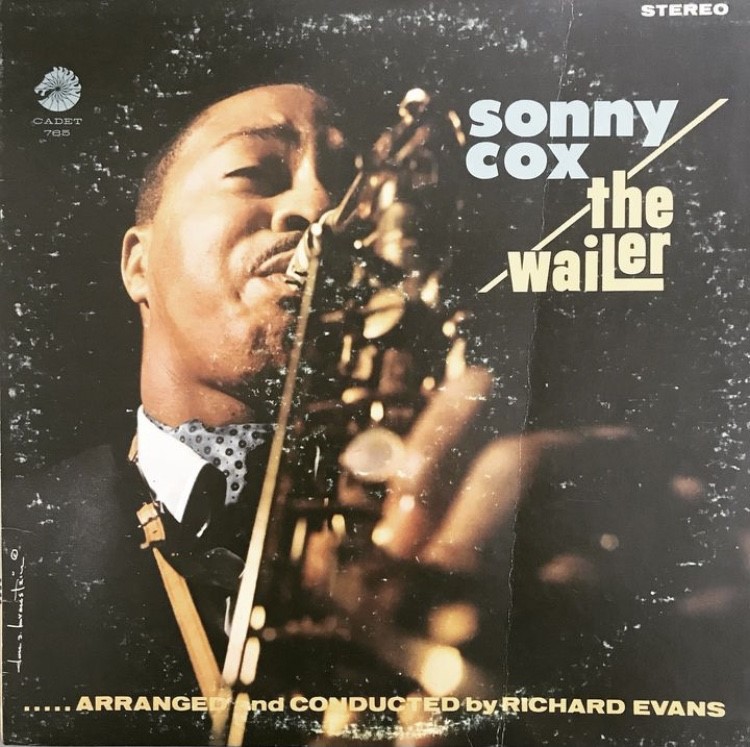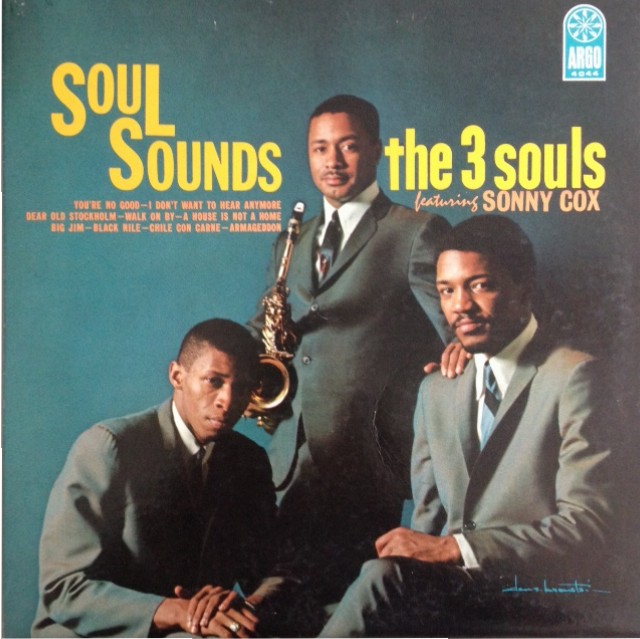From the depths of the Argo/Cadet archives, a wailer from The Windy City.
Personnel
Sonny Cox (alto saxophone), Ken Prince (organ), John Howell, Arthur Hoyle and Paul Serrano (trumpet), John Avant (trombone), Rubin Cooper or Lenard Dross (baritone saxophone), Bobby Robinson or Roland Faulkner (guitar), Cleveland Eaton (bass), Maurice White (drums)
Recorded
in January 1966 at Ter-Mar Studios, Chicago
Released
as Cadet 765 in 1966
Track listing
Side A:
Come Rain Or Come Shine
I’m Just A Lucky So And So
Soulero
The Retreat Song (Jikele Maweni)
Side B:
Berimbau (The Girls From Bahia)
The Wailer
For Sentimental Reasons
Hoggin’
In keeping with the policy of mother company Chess and Chicago’s taste for the real stuff ever since Afro-Americans had migrated north from the Delta, Argo/Cadet focused not so much on new developments as accessible jazz. Excepting Ahmad Jamal (though Argo likely considered Jamal as accessible in his own right), it released blues and bop-driven and groove-oriented albums by Gene Ammons, Sonny Stitt, Lou Donaldson, Budd Johnson and organists Sam Lazar and Baby Face Willette. The popular Ramsey Lewis was the main attraction.
When Argo changed its name to Cadet because of complaints by a similarly named company in the UK, it concentrated almost solely on soul jazz, especially after The In-Crowd by Lewis had become a million-selling record. Its roster included Ray Bryant and Brother Jack McDuff as well as promising unknowns as Bobby Bryant, Bill Leslie, Gene Shaw and Odell Brown. Another newcomer was Sonny Cox, part of The 3 Souls, which had released Dangerous Dan Express in 1964 and Soul Sounds in 1965. Cadet saw fit to release a solo effort in 1966: The Wailer.
Thereafter, the saxophonist disappeared from the scene altogether. Mr. Cox was a guidance counselor in Chicago public schools and coach of several Illinois state basketball teams. Apparently, Cox was somewhat of a legend that spotted talent and masterminded championship teams. Much akin to “Captain” Walter Dyett, the famed high school teacher that coached and strongly influenced future jazz heavyweights as Nat King Cole, Milt Hinton, Gene Ammons, Benny Green, Johnny Griffin, Eddie Harris, Clifford Jordan and John Gilmore in their formative years in Chicago.
Cadet didn’t take the easy way out. Variety on Cox’s swan song is key and the repertoire of standards, bossa, ballad, Ellingtonia, Miriam Makeba (yessir/lady) and soul/r&b is arranged expertly by Richard Evans, who perks up our ears using big brass and a low-end buzz of trombone and baritone saxophone and well-placed and timed Basie-ish riffs. Nothing wrong, to say the least, with the inclusion of bassist Cleveland Eaton and drummer Maurice White, who would join The Ramsey Lewis Trio in June. Just so in case you failed to notice, that’s White of Earth Wind & Fire fame.
They stoke up the fire of highlight Soulero, a composition by Richard Evans that develops from bolero to blues groove and is marked by Ken Prince’s sole Hammond solo, a punchy and gritty one at that. It has to be said that the dubious alto sound of Cox is a point lost, annoyingly out of tune. His solos are lively though rather uneven as well. I’m Just A Lucky So And So’s lines resemble the path of a sheep that broke out of the herd and shuffles panic-stricken through the dunes. Admittedly, he strongly fills the breaks on Hoggin’, a gritty copy paste from Hi-Heel Sneakers, courtesy of the leader.
So, to conclude, a one-time leader that made a hip and soulful record in spite of himself.
Only partly available on YouTube, here’s The Wailer and Berimbau (The Girls From Bahia). There’s a task here for (reissue) labels, let’s say the one and only Fresh Sound Records…



